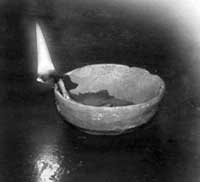 Nepal undeniably needs a good kick in the pants to spur economic growth. And obviously taking a month off is the way to do it. Dasain and Tihar are wonderful festivals, a time to reaffirm one's commitment to family, society and so forth through the copious swilling of liquor, eating of goat and gambling of life savings.
Nepal undeniably needs a good kick in the pants to spur economic growth. And obviously taking a month off is the way to do it. Dasain and Tihar are wonderful festivals, a time to reaffirm one's commitment to family, society and so forth through the copious swilling of liquor, eating of goat and gambling of life savings. But, the Beed, ever the clear-eyed killjoy also sees it as a month during which productivity is at a disgraceful low, and many offices take on the appearance of ghost towns. It is autumn, and most of the population, sensing the end of the warm season, unthinkingly makes merry and, like the grasshopper, regrets it through the winter.
This year, while the garment importers operating out of tax havens in Indra Chowk and its by-lanes may argue that there has been a visible recession, retailers nevertheless did frenzied business during the festivals. A good monsoon is always a good prelude to a good Dasain, and agricultural prosperity has been on the up this year. The dim, but noticeable, rays of hope emanated by the peace talks between the government and the Maoists have also fuelled some optimism in villages. Cities like Pokhara and Dharan, which have historically been happy to buy, buy, buy, saw their brisk Dasain business spill over into Tihar. But still, Thamel isn't doing too well, and retailers, hoteliers and restaurateurs there say they don't remember a festival time in recent years when there have been such few tourists.
Tihar, this Beed was thinking, is actually the best time to assess the state of the economy, based on the money that changes hands. Gambling is as much part of our national psyche as are drinking and the daura-suruwal, and since the festival legitimises betting day and night, we raise the stakes pretty high and a mind-boggling amount of cash is exchanged. It is always rude to ask people the source of their income, and never more so than during Tihar, nevertheless, there ought to be something that can be done when in one night businessmen bet amounts that officially they have earned over three years, and government employees play more than their life-time earnings.
One may be censorious of the bacchanalian lunacy that descends on the Nepali nation in the festive season, but that does not blind one to some rather interesting sociological changes in the making. For instance, it was quite something to be out on the streets during Dasain. Despite everything, this Beed felt a frisson of delight at seeing the bright lights and all the hustle and bustle, a nice change from the deserted streets and empty shops one has come to expect at this time of year. Normally, during Dasain and Tihar women have been homebound, attending to the demands of the men in their lives and feeding all and sundry. With the growth in nuclear families, and more women working, people are celebrating festivals differently, too.
This has happened all over the world, and is always accompanied by the lament that so-and-so traditional festival has become a money-spinner for such-and-such. Well, I ask, what's wrong with that. People are getting out of their houses and it is the beholden duty of any self-respecting businessperson to lure them in. We should have carnivals revolving around religious or cultural themes-that is one way to boost domestic as well as international tourism. These events could be in any part of Nepal. Increasing mobility, better roads and air connections should be leveraged to encourage people to travel.
Entrepreneurs in the tourism and hospitality industries, together with business associations, should try this out next year. Think about it as you have what I hope is a happy and prosperous Tihar!



